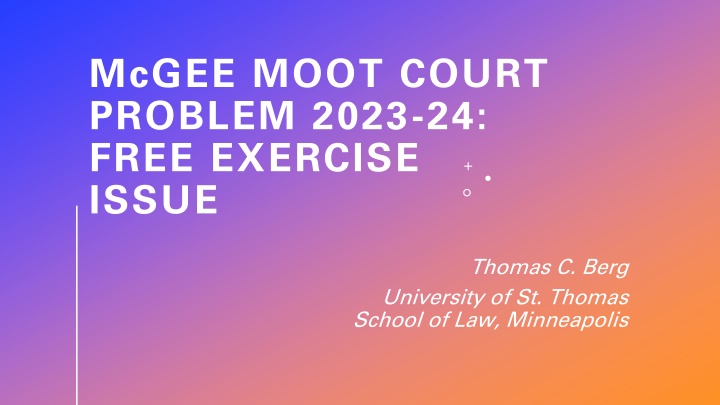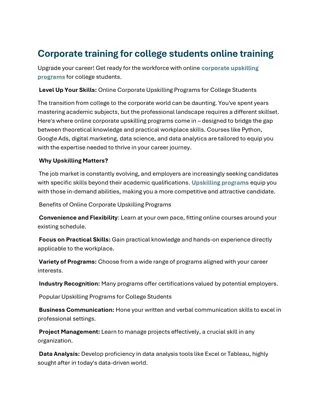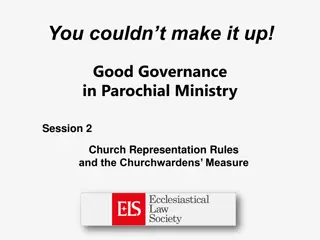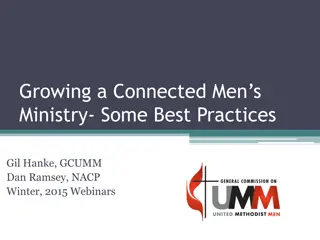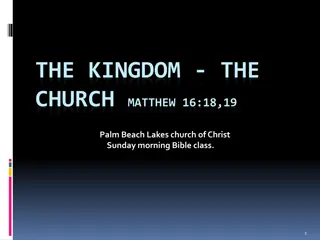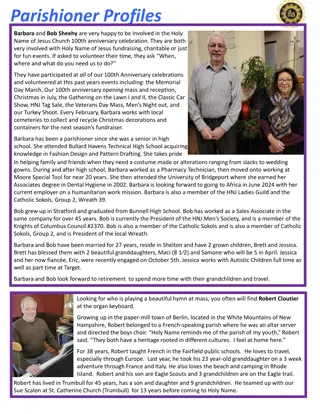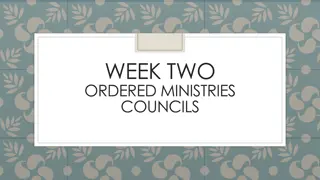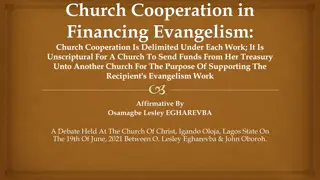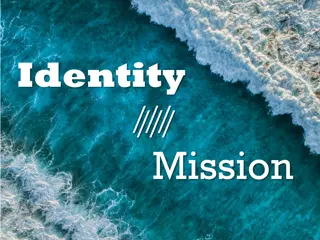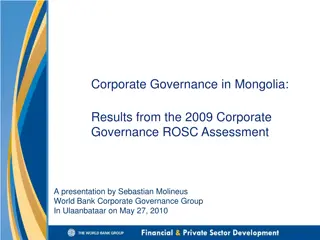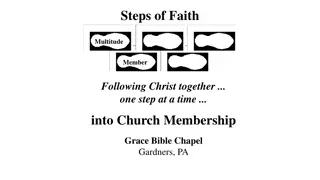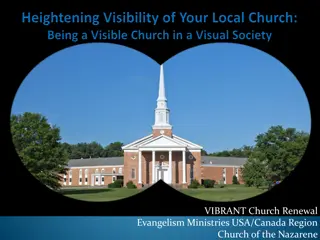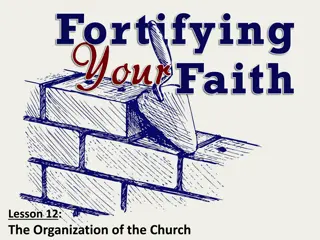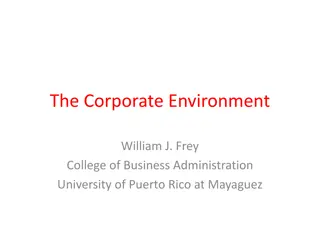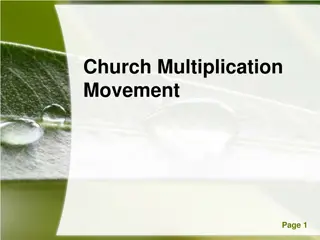Church Struggles: Why Corporate Prayerlessness?
The church struggles with corporate prayerlessness due to various reasons - being too busy, overwhelmed, comfortable, guilty, or anxious. These challenges are addressed through biblical references, urging believers to seek strength, grace, and peace through prayer and faith. Tags: Church, Prayerlessness, Busy, Guilt, Anxious
Download Presentation

Please find below an Image/Link to download the presentation.
The content on the website is provided AS IS for your information and personal use only. It may not be sold, licensed, or shared on other websites without obtaining consent from the author.If you encounter any issues during the download, it is possible that the publisher has removed the file from their server.
You are allowed to download the files provided on this website for personal or commercial use, subject to the condition that they are used lawfully. All files are the property of their respective owners.
The content on the website is provided AS IS for your information and personal use only. It may not be sold, licensed, or shared on other websites without obtaining consent from the author.
E N D
Presentation Transcript
McGEE MOOT COURT PROBLEM 2023-24: FREE EXERCISE ISSUE Thomas C. Berg University of St. Thomas School of Law, Minneapolis
KEY FACTS Charter school (BCS) was approved in 2022, to open fall 2023. It s operated by a religious non-profit organization (Eternalist Foundation), as an Eternalist school. And it will teach (require) courses in history, tenets, philosophy and practices of Eternalism (although it accepts students of all faiths). But also teach same subjects generally offered in public schools. Employees must follow code of conduct derived from Eternalism. Before opening, BCS rescinded job offer (math teacher) to Maxwell because she was in same-sex marriage (barred by code of conduct). Maxwell sued arguing (1) approval of BCS as charter school violated state law, (2) BCS s discrimination violated 42 USC 1983 (14th Am?). 2
01/23/2024 3 ISSUES IN MAXWELL v. MCGEE STATE BD.OF ED. 1. Does the state provision prohibiting a charter school from being operated by a religious institution which intends to provide religious instruction in the charter school violate the Free Exercise Clause? 2. Is the school s employment decision (refusing a teacher in a same-sex marriage) state action under 42 USC 1983 (because it s unlawful discrimination )?
9/3/20XX 4 PRESENTATION TITLE ISSUE #1. FREE EXERCISE AND CHARTER-SCHOOL STATUS I. Free Exercise Principles/Cases II. Complications
I. FREE EXERCISE PRINCIPLES/CASES Intro SCOTUS case law has changed concerning free exercise & funding. Free Exercise Clause has long prohibited restrictions that discriminate against religious exercise. E.g. Lukumi (1993) (invalidated laws targeting religious animal-killings) But at the same time, SCOTUS used to require that religious K-12 schools be excluded from (many) government funding programs. Under First Am s Establishment Clause (EC) (Lemon v. Kurtzman test) Funding advances religion ; strings on $ entangle govt. in religion Since 2000: shift to emphasizing nondiscrimination in funding too EC doesn t require excluding them; but does Free Ex forbid it?
Locke v. Davey: an exclusion of religion upheld Washington state funded college scholarships for students based on promise and income limits; but it excluded students majoring in devotional theology. Withdrew scholarship from Davey, a theology major at a Pentecostal Christian college. SCOTUS (2004) upheld the withdrawal 2 themes: 1) This excluded funds for training for the ministry : Historic, substantial state interest : founding era rejected taxes for clergy It s a distinct category of instruction [vs. general subjects taught from a religious perspective] 2) The 2 clauses allow some play in the joints : discretion whether to fund BUT: 2 recent decisions invalidateexclusions of religious recipients 9/3/20XX 6
1. Trinity Lutheran Church v. Comer (2017) Missouri state grants to help nonprofit schools, daycares, etc. purchase rubber playground surfaces made from recycled tires State denied funds to Church s daycare on ground that under [the] Missouri Constitution, the Department could not provide financial assistance directly to a church. SCOTUS held: 1) State discriminates againstotherwise eligible recipients solely because of their religious character ; that triggers the most exacting scrutiny. (E.g., Lukumi) 2) [T]he liberties of religion/expression may be infringed by denying or placing conditions upon a benefit. (E.g., unemployment cases) 3) Distinguished Locke: Davey was denied a scholarship because of what he proposed to do use the funds to prepare for the ministry. Trinity was denied a grant simply because of what it is a church. 7 9/3/20XX
The status/use distinction Trinity fn. 3: This case involves express discrimination based on religious identity . We do not address religious uses of funding . McGee s provision arguably discriminates based only on use (by ex- cluding a religious organization that intends to provide religious instruction in the charter school ). Does the status/use distinction make any sense? Pro: The distinction preserves some discretion to limit funding of religion Con: Whether it s discriminat[ion] against status or use makes no difference; it is a violation of the right to free exercise either way . Our cases have long recognized the importance of protecting religious actions, not just religious status. Gorsuch, J., concurring in Espinoza v. Montana Dept. of Revenue (2020) SCOTUS resolved the issue in 2022: rejecting the distinction 8
2. Carson v. Makin (2022) For remote areas without public school, Maine paid the tuition for parents choice of private school but only nonsectarian schools. Sectarian = school that promotes the faith or belief system with which it is associated and/or presents [subjects] through the lens of this faith. State/CA1 argued this was use-based ; SCOTUS rejected the distinction. [We have] never suggested that use-based discrimination is any less offensive to the Free Exercise Clause. Teaching faith lies at the very core of a private religious school s mission. Scrutinizing how school pursues its mission would raise serious concerns about state entanglement and denominational favoritism. Locke v. Davey cannot be read beyond its narrow focus on vocational religious degrees [clergy/ministers]. 9
Possible questions re. this case If Plaintiff s counsel argues the exclusion of BCS is based on its religious instruction, not its religious identity: Doesn t Carson v. Makin reject the status/use distinction? And Trinity/Carson limit Locke to vocational religious degrees. Does it matter if funding goes direct to the charter school? No (in Trinity/Carson the state directly paid the school); but must the allocation be per-student (i.e., direct result of parental choice)? To Defendants counsel: Could we (or the state) require BCS ro separate the Eternalism theology classes (but not other subjects)? That avoids penalty on religion from denying $ for general subjects? The invalid policy in Carson etc excluded a religious school entirely. 10
II. 2 POTENTIAL COMPLICATIONS RE THE FREE EXERCISE ISSUE 11
II. COMPLICATIONS RE FREE EX? A. School s Discriminatory Act? Hypo Q: What if McGee excluded the school not because of its religious instruction, but because of sexual-orientation (sex) discrimination against a same-sex marriage? Arguably, such an exclusion would not discriminate against religion (no charter school could so discriminate). Might the school have a right to discriminate under church autonomy principles (especially the ministerial exception )? Straightforward answer: The record doesn t show McGee has any such exclusion based on a school s discriminatory acts. Under the problem, the only free exercise issue is the religious exclusion. 12
Complication B: State Action Trinity/Carson control if this is a private school But if it s a public school (state actor or state action), the Establishment Clause (EC) applies and restricts religious instruction by the school. Cites: classroom-prayer cases (Engel v. Vitale (1962), Abington Sch. Dist. v. Schempp (1963)); graduation-prayer case (Lee v. Weisman, 1992) And free exercise has never meant that a majority could use the machinery of the Stateto practice its beliefs. (Schempp) So, arguably Issue #1 (free exercise) collapses into #2 (state action). If state action is more likely re. curriculum/students than employment (see those slides), then is BCS religious instruction more likely to be state action? OTOH, courts in 1970s decisions said that aid to schools with religious teaching is less problematic than aid to schools that discriminate: [T]he Constitution places no value on discrimination as it does on the values inherent in the Free Exercise Clause. Norwood v. Harrison (1973)
QUESTIONS? Subtitle
